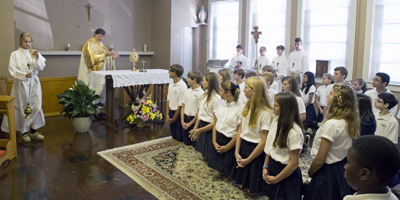DIOCESE—Creative email scammers are now targeting churches in their ongoing efforts to separate innocent people from their money.
Several parishes in the Diocese of Charleston were recently targeted by unknown scammers who pretended to be the pastors asking parishioners for help.
On Jan. 21 and 22, several people at Transfiguration Church in Blythewood received text messages on their phones that appeared to be from Msgr. James LeBlanc, the pastor, according to church secretary Valerie Shealy.
In the messages, the person posing as Msgr. LeBlanc said he wanted to buy some iTunes gift cards for cancer patients at a local hospital, but did not have time to go to the store to purchase them. Recipients of the text messages were asked to purchase three $100 iTunes gift cards, scratch off a section of the gift card and send a photo of the card’s pin number in a return text message.
The scammers even added the touch of signing off with “May the peace of the Lord be with you,” Shealy said.
People who received the messages contacted the church office. Msgr. LeBlanc directed the staff to send out an email to the entire parish letting them know not to respond to this type of text message.
“We clarified that the pastor would never ask anybody directly for money,” Shealy said.
A similar incident took place several times over the past few months at Immaculate Conception Church in Goose Creek, only this time the scammers used email as their platform of choice. They sent emails appearing to come directly from Adorno Father Noly Berjuega, the pastor.
The Goose Creek scammers’ pitch was almost identical to what they attempted in Blythewood. They asked parishioners to purchase iTunes gift cards for children who were in the hospital and to send along the pin numbers of the cards.
Father Berjuega said the first emails were sent in July and November 2018, and the most recent wave of scam activity happened during the first week of January. He said, unfortunately, a few people who were targeted followed the request and purchased the iTunes cards.
He warned parishioners about the attempted scam through bulletin announcements and a post on the parish website.
“I want people to know I would definitely not be sending out personal requests for money or gift cards,” he said. “The parish has established ways for raising money, and this is not one of them.”
It is uncertain how the scammers harvested cell phone numbers and email addresses of parishioners, although it is possible they found some information that was published online in parish directories or bulletins.
To learn more about various email and phone scams and how to protect yourself, visit the Federal Trade Commission’s consumer alert site at https://www.consumer.ftc.gov/.
The South Carolina Department of Consumer Affairs also offers information about the latest computer scams and a place to report scams at https://www.consumer.sc.gov/identity-theft-unit.



